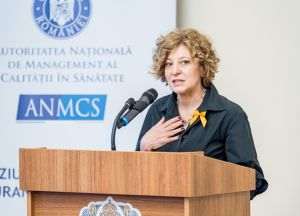Drawing up the state budget draft, resuming the school year, in the second semester, with pupils and students physically attending courses, the waiving of free access to railroad transport for students, the protests of the public sector employees and the beginning of this year's first ordinary session this year of Parliament are some of the factors that influenced the economic and political activity in February.
The effervescence on the political, economic and social scene was stimulated by the fact that in February, the pandemic in Romania reached somewhat of a plateau, with very low rates of SARS- COV 2. But, unfortunately, the plateau represented the calm before the storm announced for the beginning of March by the 3923 cases of February 26, i.e. exactly one year after the triggering of the Covid-19 pandemic in Romania.
The Chamber of Deputies and the Senate began the first ordinary session since 2021 on the very first day of February. The rush with which lawmakers resumed their activity in the new year, unlike in other years when the session began around February 15, was due to Prime Minister Florin Cîţu's January announcement, that on February 4th, he would send to the Parliament the State Budget Law and the Social Security Budget law for 2021. Unfortunately, that happened six days before the end of January, as well as after countless debates both within the ruling coalition and in the Executive on those laws.
On February 2, President Klaus Iohannis announced that on February 8, education with physical attendance would resume: "In localities where there are few cases of Covid-19, in the so-called green scenario, all children will physically attend school, from kindergarten, to primary, secondary schools and high-schools. In localities where the number of cases is higher, the so-called yellow scenario, kindergarten children will attend physically, grades I-IV will go to school, and in the secondary cycle only 8th grade children will physically attend school, because they are preparing for their high-school admission exam, as will those in 12th grade, who are preparing for their high-school graduation exam. In localities where, unfortunately, there are quite a few cases, which are in the so-called red scenario, only kindergarten and grades I-IV children will attend, while the rest will study online. So, in the red scenario, the little ones attend physically, and the grades 5 to 12 will go to school online. And in localities where the number of cases is higher, localities that go into quarantine, naturally everyone will stay at home".
• Exporters removed from the government's priority list
The day also brought unpleasant news for small- and medium- sized exporters, which found out this year that the government drastically cut funds for their promotion abroad. More specifically, Claudiu Năsui, minister of the Economy, Entrepreneurship and Tourism, said that he was no longer willing to support the promotion of Romanian exporters. The minister says that in fairs it's always the same companies that attend, that there is no quantification of the results of attending those fairs - a fact which has also been reported by the audit of the Court of Auditors - and that the companies that organize those trips collect significant fees.
The next day, the members of the National Export Council and several employers' associations sent an open letter to President Klaus Iohannis, Prime Minister Florin Cîţu and the Presidents of the Two Chambers of Parliament wherein they accused Minister Claudiu Năsui of burying Romanian exporters. In fact, as proven by the state budget law, the minister in question allocated only one million lei for that activity, as opposed to the 130 million lei requested by the respective companies.
• The government's priority - selling off Romanian companies to foreigners
On the date of the above-mentioned letter, 3 February, the Government approved the draft law that repeals Law 173/2020 and practically allows the sale of state-owned assets and part of their state-owned shares on the stock market. The bill was sent to Parliament, for debate and adoption, even if it sparked anger among the opposition, as PSD and AUR leaders accused the government of wanting to sell -off Hidroelectrica, the Otopeni and Băneasa Airports and the Constanţa Port.
Regarding the state budget, which should have been sent to the Parliament on January 4, the head of the government said it would be sent after it was properly drawn up.
"It is not a simple budget, it is a budget that looks at the 2021-2022 timeframe, it is a budget that begins to fix abnormalities introduced into Romania's legislation over the last four years. I will give you just one example: salaries have doubled in 2016 - 2020, from 57 billion lei annually to 110 billion lei. I do not think anything has doubled, revenues have not doubled in Romania over the last four years, the economy has not had a doubling in its dynamic over the last four years, but staff costs have doubled", Florin Cîţu said.
The Prime Minister also stated that the draft State Budget Law would also be accompanied by a public system reform program, with one of those reforms being the restructuring of state-owned companies that post losses every year.
• The austerity ordinance has foreshadowed the strict limits of the state budget
The school year was resumed without incidents on February 8, and, according to the information provided by the Minister of Education, Sorin Cîmpeanu, over 2.4 million students out of a total of 2,915,000, physically attended class, in the beginning of the second school term.
On February 10, the Government extended by another 30 days the state of alert in Romania, starting with February 12. During the meeting, the so-called austerity ordinance was read in its first draft, which displeased the trade unions, which have been protesting for more than a month, as well as the student and retiree associations. That normative act stipulates that the pension point would be frozen in 2021, that no holiday vouchers would be issued this year and that students would no longer be able to travel by train free of charge.
"We will raise the pension point starting with January 1st, 2022, like it's always been done so far. It must be very clear that this year the pension point is 1442 lei. (...) In 2020 and 2021 pension expenditures will amount to 19.2 billion lei. (...) With regard to holiday vouchers, vouchers issued in 2019 and those in 2020 have been extended, which means that in the economy there are vouchers of nearly 2.4 billion lei that have not been used. (...) Therefore, holiday vouchers that should have been issued this year will be issued next year and this year's budget will save on that expenditure. (...) Another subject (...) is the exemption which the PSD gave students traveling by train in 2017; it will change and go from 100% to 50%", said PM Florin Cîţu, who said those were not budget cuts, but rather the placement of caps on certain public In expenditures.
He noted that, by the measures disposed by that normative act, nearly 3.3 billion lei would remain in the private sector, with companies and individuals.
• 7,16% - the estimated budget deficit for the end of 2021
With regard to the draft law of the state budget being worked on, the head of the Government said: "The budget deficit we estimate is about 7.14 - 7.15 - 7.16, we will see, we will have to make more precise calculations, to see what the final figure will be, but that is where we will stop. And as for the deficit adjustment ... That is one very important element: that deficit of 7.16, say, which is what it stands at right now and we're hoping it won't go any higher than that, leads to an ESA deficit - and that is the deficit that the European Commission uses to make its evaluations, as do ratings firms and international partners - almost 8.2% of GDP, which means that last year we had an ESA deficit of 9.1. The adjustment is less than one percentage point. It should be known that the Commission is not very happy with this adjustment, and we will have to convince them that we are credible, that is why we are coming up with the 2022 budget to show that we are credible and that we have reforms and the following year.
The return to 3% will happen, we will return below 3% on cash and on the ESA deficit as well in 2024, and I can tell you that in 2022, there is a deficit of 5.84 on cash, 6,36 according to the ESA, 4.37 for cash in 2023 and 4,68 on ESA, while in 2024 - 2.89% of the GDP for cash and 2.9 on ESA. So, it's a 4-year program to stabilize the public finances and to return to a deficit below 3%. We've said that this year's revenues will increase almost 13% compared to last year, which means 32.68% of the GDP, but in that regard, please note that a large part of that are revenues which we have postponed last year through fiscal measures. We will be collecting them this year".
The prime minister also said that the budget will allocate 61 billion lei for investments, that structural spending will be stopped and, reforms will be conducted to eliminate the wasteful spending of public money.
• MPs without special pensions, unions protesting in the streets
On February 16th, concerted protests organized by several union federations, displeased with the austerity ordinance proposed by the Cîţu government. Railroad workers, policemen, medical workers and some of the public sector employees protested in front of various central institutions, against the wage freeze policy enacted by the Cîţu government and the lack of investments in many sectors. Protests continued daily throughout last month.
On February 16, concerted protests took place from several trade union federations dissatisfied with the austerity ordinance proposed by the Government. Railway workers, contractual police officers, medical staff, and part of civil servants protest at different headquarters of central institutions, to the salary freezing policy decided by the Government and the lack of investment in several areas of activity. We mention that the protests continued daily throughout the last month.
On the same day, in the Old Center of Bucharest, owners and employees of restaurants, cafes, bistros and fast food joints protested against the restrictions imposed by the authorities, as well as to demand the unlocking of the funds needed to cover 20% of the financial loss posted by HoReCa businesses in 2020, compared to 2019.
The next day, the joint session of the Parliament amended the bylaws of deputies and senators and eliminated their special pensions. An unpleasant piece of news came from the RCC (Romanian Constitutional Court). The Constitutional Court, by decision of 17 February 2021, has practically "legalized" tax evasion, as long as the defendants pay back the whole damages caused. The RCC rejected the objections of the High Court of Cassation and Justice, the Government and the Ombudsman, and found that the draft passed by the former Parliament amending Law 241/2005 on the prevention and fighting of tax evasion, was constitutional. The draft provides for a fine in place of prison, in the case of persons accused of a tax evasion of up to 100,000 euros which fully pay back the damages. According to the same normative act, if the damages caused by the tax evasion offense, plus 20% of the base amount, plus interest and penalties are fully paid back during the criminal prosecution or the trial, than the defendant will no longer be criminally sanctioned.
• Miner barricaded in the mines, the government concerned with capping expenses
On the same day, the issues that went unresolved for the last years in the Jiu Valley mining region seemed to escalate, after over 100 miners from Lupeni barricaded themselves underground due to their wages and other benefits not being paid on time in 2020. They were then joined the next day by the miners of Livezeni. The protest escalated, the Mintia thermoelectric plant was left without coal for several days, and following the negotiations in Bucharest, the receiver submitted their resignation. The issue was subsequently solved by the Cîţu government, which found a way to pay the overdue compensation to the miners in the Jiu valley, and secure the financial resources for the payment of the miners' wages for the next three months (11 million lei).
On February 18, Prime Minister Florin Tîţu announced that the Executive passed the so-called austerity ordinance of 2021 which froze the pension point, the holiday vouchers would no longer be granted this year, the 30% pandemic bonus would no longer be paid, the The pandemic in the prefectures, students would no longer have the possibility to travel by train free of charge, and the law on the status of railroad staff would be postponed by one year, law which provided that said staff would see two wage raises in 2021.
With regard to the draft law of the State Budget, Prime Minister Florin Cîţu said that the deficit was set at 7.16% and that on the same day, the Fiscal Council favorably endorsed that project, even if the members of the Economic and Social Council gave a negative opinion, due to the freezing of wages and pensions, as well as due to the new schedule for the raising of children's allowances paid by the government.
The head of the Government announced that the draft budget would be supported by a reform program that includes the reworking of salary bonuses increases in the public system, which last year amounted to 27 billion lei.
• Two distinct approvals of the budget, due to the blundering of the government
February 19th is the day when the government finally approved the draft state budget law and the state social insurance budget law. Prior to that, that same day, the state budget received the endorsement of the Supreme National Defense Council (CSAT) in respect of the budgets allocated to the Ministry of National Defense, the Ministry of Internal Affairs and the Romanian Intelligence Service (SRI), the Foreign Intelligence Service (SIE), the Special Telecommunications Service (STS) and the Guard and Security Service (SPP). Also approved in the CSAT was National Defense Strategy for 2020-2024.
Regarding the state budget, after the government meeting, Prime Minister Florin Cîţu said: "In the general consolidated budget, total expenditures amount to 397,515 million lei of which staff expenditures - 109,511 million lei. In the state budget, total expenditures are 223.702 million lei, whereas staff expenses amount to 55.834.9 million lei. The general consolidated budget deficit, or the balance of the consolidated general budget is 80 million lei. Nothing has changed. We have also approved the evolution of the deficit, the annual structural balance of the public administration, the annual deficit. In 2021, we're talking about structural estimates - 742, in 2022 - 607 and in 2023 - 43. We are talking about the structural balance, it is calculated relative to potential GDP".
Unfortunately, the legislative package on the state budget and the state social security budget had to be approved again by the Government, three days later, on February 22nd, because in the meeting of February 19th, the government did not have the opinion of the Legislative Council on those initiatives. That is why the state budget draft was sent to the Parliament only on February 23rd, which only allowed for a very short time for the debate in the specialized commissions and for debate and adoption in the joint session.
Prior to sending the state budget to the Parliament, new political settlements of scores happened from the stand of the Chamber of Deputies between Prime Minister Florin Cîţu and the members of the governing coalition, on one side, and PSD lawmakers on the other, during the Prime-Minister Hour, on February 22nd, which had as its topic "The budget of many cuts: Romania's economic death!".
The next day, the Senate passed the bill for the approval of the caps on some indicators specified in the fiscal-budgeting framework of 2021, draft which would pass the Chamber Deputies February 24, when President Klaus Iohannis issued the Decree on Promulgation of the Law which eliminated the MPs' special pensions.
Also on February 24, the Government approved the first tranche of 20,000 doses of 200,000 vaccines promised to the Republic of Moldova. After the executive meeting, Prime Minister Florin Cîţu said that this year, the government will borrow at at least 80 billion lei.
At the end of last month, between February 25-27, the joint parliamentary committees debated and approved, without amendments, as proposed by the Government, the State Budget and the State Social Security Budget Law. 3466 amendments submitted by PSD and AUR senators were rejected. The two laws were debated and passed in the Parliament's plenum on March 1st and 2nd.
• The NBR warned banks for their behavior towards customers
The National Bank of Romania (BNR) has once again warned banks for their behavior towards customers. First deputy-governor Florin Georgescu sent an address to lenders in February, warning them to take care of their clients and consider them partners, not to treat them like they would some financial terrorists.
For a long time now, when some banks have been forced to implement certain European directives, they've blamed the NBR, to justify themselves, said Adrian Vasilescu, strategy consultant at the NBR. He pointed out that banks are asking their customer to answer certain questions, they "anger them" and then tell them that that is what the NBR has asked them to do: "It is already a reflex for many banks".
It seems that in the procedures for implementing the Directive on the prevention of the use of the financial system for the purpose of money laundering or terrorist financing, banks question customers too thoroughly and even lock their accounts, alleging that they are doing so because they are required by the central bank.
Adrian Vasilescu told us: "This time it is a new situation. Saying that they comply with EU regulations related to the selection of customers according to certain requirements, the banks claimed that the legislation applies to some important companies and closed down their accounts, thus causing major outrage. The banks said that that was what the NBR asked them to do. Of course, the National Bank always demands that laws be obeyed. There are norms of the NBR that do not have the strength of a law, but complement and comply with certain requirements of European regulations. This time, banks have conducted data update campaigns, called customers to come in and they felt insulted. But it is one thing to be bothered by the fact that you are called to the branch to fill in some data and quite another to wake up with your account closed and with the bank's request to withdraw your money".
In Adrian Vasilescu's opinion, it is possible that some companies may even have transactions with foreign companies likely to be in contact with terrorists and those companies have had their accounts canceled. However, under those circumstances, the bank must tell the customers what is up, the NBR representative says: "People need to know that this is a very firm EU directive that requires the selection of customers on certain criteria, especially not being suspected of links to terrorism, organized crime, etc., not to be told that this was what the NBR demanded. The National Bank found itself with complaints from companies, asking why it issued such directives and what connection the central bank has with their company. It was politely explained to them that the NBR does not work with bank customers, but since it is an EU norm, the National Bank certainly always reminds of the need to comply with the law".
Adrian Vasilescu stresses that banks must take note of the NBR bulletin and act accordingly.
The European Directive on Preventing the Use of the Financial System for Money Laundering or Terrorist Financing has emerged as a result of sophisticated money laundering mechanisms, with each bank being required to draft a set of internal rules that it sends to the NBR for approval. The National Bank looks over them and, if those rules comply with the minimum standards of compliance within the European Directive, then it endorses them.
• The Fidelis and Tezaur programs, which the population can lend to the government through, will also continue in 2021
The Fidelis and Thesaurus programs by which the population can lend to the State will be continued in 2021, according to a report by the Ministry of Finance accompanying the budget on 2021, made public in February.
The introduction of facilities that allow online subscriptions and payment upon maturity to investors is being considered for the TEZAUR program. With regard to debt, in the medium term, a diversification of funding instruments is considered, by making "green bonds", and to that end, a first step is to create the General framework of green bond issues at the sovereign level, which will be marked in the state budget as "green" investment / expenses.
















































